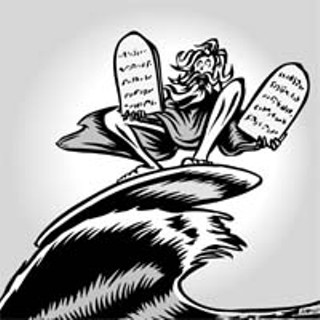Letters at 3AM
Hang Ten, Dude
By Michael Ventura, Fri., April 14, 2000

The phrase "hang ten" is surfer slang that originally described a particular placement of one's feet (10 toes) on the surfboard. Those beer-drinking, pot-smoking beach boys -- who call each other "dude" and whose work ethic consists of waiting for just the right wave -- might be surprised to know that they coined the phrase that's been adopted by people who want the Ten Commandments posted in every American classroom: "The Hang Ten Movement." Hang Ten began in support of Alabama Judge Roy Moore, who in 1995 hung the Ten Commandments in his courtroom and has refused to take them down despite legal challenges. In Congress not only conservative Republicans, but one-quarter of House Democrats, have gone against several Supreme Court decisions and voted to let states display what they call "the code" in their schools. Indiana and South Dakota now have Hang Ten laws on the books; the Kentucky legislature has just passed a Hang Ten bill, and their Democratic governor is expected to sign it; Mississippi, Colorado, Florida, Georgia, Illinois, Iowa, Michigan, Missouri, and Oklahoma, have Hang Ten laws pending in their legislatures, and many states are expected to follow. Last summer Gallup reported that 74% of Americans favor Hang Ten. That's some wave, dude.
Before being inundated by this wave, it might be helpful to examine the Ten Commandments as a teaching tool in the American classroom. (If you care to look up the original, it's phrased differently in three books of what Christians call "The Old Testament": Exodus, Chapter 20; Leviticus, Chapter 19; and Deuteronomy, Chapter 5.)
The First Commandment: Thou shalt have no other gods before me. By placing its authority behind that statement, the school is claiming to know both that there is a God and the identity of that God, though neither the school nor anyone else can produce evidence to support those contentions. If a student asks who the "me" in the First Commandment refers to, as any good student eventually will, what is a teacher to say? And if a student does not believe in the Old or New Testament, as a Hindu or American Indian or Yoruba student very well might not -- then the school is demonstrating, right there on the wall, that such students, and their families, and their ancestors, are wrong and even sinful, simply for what they believe. Does any school, especially an American school, have the right to do this to a child?
(But I wonder if such an urgent question has the power to concern us as a people, much less shock us, when several states now require that "Creationism," a religious belief for which there is no data, be taught with the same gravity as evolution, a scientific hypothesis for which there is considerable data. Last week the Oklahoma House of Representatives passed a bill requiring science texts to state "that human life was created by one God of the universe." In state after state, government is setting itself up as the arbiter of religious belief, and there isn't a high-visibility politician in the country with the courage to call this an outrage.)
The Second Commandment: Thou shalt not make unto thee any graven image, or any likeness of anything that is in heaven above. Jews, Moslems, and many Protestants, won't have a problem with this, but we Catholic and Eastern Orthodox types are in big trouble. Our churches, not to mention our homes and our cars, flaunt the breaking of the Second Commandment everywhere you look. Are we supposed to pull down the Sistine Chapel, where Michelangelo depicted God in Heaven in no uncertain terms? Remember, kids are sticklers. When it's stuck in their face that way, they'll spot the contradictions we gloss over and they'll ask questions. Are you sending Catholic kids home questioning their faith? Well, teacher? What's your answer when that kid raises a hand?
The Third Commandment: Thou shalt not take the name of the Lord thy God in vain. Again the school is fronting the assumption that this particular Lord is thy God, whether you like it or not. This is the most unAmerican of the Ten Commandments -- when it's enshrined on the wall of a school. A school has the right to require decorum in the speech of its students, but in a free country how I speak of the Lord my God, if I recognize such a god, is between me and my god, and it's none of the school's business.
The Fourth Commandment: Remember the Sabbath day, and keep it holy. Christians are in trouble here. Sunday ain't the Sabbath of the God of Exodus, Leviticus, and Deuteronomy. That God, specifically and repeatedly, requires the Sabbath to begin at sundown on Friday and continue till sundown on Saturday. This was the Sabbath that Jesus observed, as the Gospels make very clear. All Christians break this commandment every week. Of course, sometimes Jesus bent Sabbath rules, and justified himself by saying, "The Sabbath is made for man, not man for the Sabbath." (Mark 2:27) What are we supposed to make of that? Was Jesus fudging? Specifically, what is a child in school supposed to make of it? Especially if that child is neither Christian nor Jewish nor Moslem.
The Fifth Commandment: Honor thy father and mother. As we grow older we learn that if we cannot find anything to honor in our parents we have difficulty honoring ourselves. But for children with abusive parents (and they are many), this commandment puts them in a gruesome bind. For these kids, a school that nails this commandment to the wall is putting the nail in their foreheads. Also, Christians are in trouble here again. The adult Jesus never mentions his earthly father in any way, and his references to his mother are usually insulting. He also says "I have come to set a man against his father, a daughter against her mother," (Matthew 10:34), and "Do not call any man on earth father, for you have one Father, which is in heaven," (Matthew 23:9). Is the school prepared to take on these paradoxes? If it's not, best get that commandment off the wall.
The Sixth Commandment: Thou shalt not kill. Oh goody, let's leave that one up there. And leave it to our beleaguered teachers to explain why it's okay to kill for your country in spite of the Sixth Commandment, and why "the Lord thy God" commands his people to do so much killing in the Bible. To quote one of hundreds of such commands: "Cursed be he who withholds his sword from blood!" (Jeremiah 48:10). Yes, leave it to America's teachers to reconcile the Sixth Commandment with Psalm 137, which ends, "Happy shall he be that taketh and dasheth thy little ones against the stones." Is this the Dude the name of Whom I'm not supposed to take in vain?
The Seventh Commandment: Thou shalt not commit adultery. After the teacher has dodged the question, can't you just see all these seven-year-olds going home and asking, "Mommy, what's adultery? Is it, like, I shouldn't ever be an adult? Or -- what?"
The Eighth and Ninth Commandments: Thou shalt not steal. Thou shalt not bear false witness. Finally, we're on solid ground. Clear, unambiguous, not contradicted too much within the Bible, and not stuffing a Lord-thy-God down unsuspecting throats. The Ninth does call into question all those ads the kids are bombarded with, but what's wrong with that?
The Tenth Commandment: Thou shalt not covet thy neighbor's house, thou shalt not covet thy neighbor's wife, nor his manservant, nor his maidservant, nor his ass, nor anything that is thy neighbor's. "Mommy, what's 'covet'? And what's it got to do with my neighbor's ass?" In an economy fueled precisely by coveting, and in schools that are trying to train our kids to compete as fast-track career coveters, the parroting of this commandment can only teach our kids to be as good at hypocrisy as we are.
The issue of the Ten Commandments is addressed in the Christian Bible, the Gospel of Matthew, 22:35-40: "One of their number tested him with this question: Master, which is the greatest commandment in the Law? He answered, 'Love the Lord your God with all your heart, with all your soul, with all your mind.' That is the greatest commandment. It comes first. The second is like it: 'Love your neighbor as yourself.' Everything in the Law and the prophets hangs on these two commandments."
It is extraordinary that neither of the commandments that Jesus thought most important is included in the usual American list of the Ten Commandments as preached by the Hang Ten movement -- yet America claims loudly to be a Christian country. The Hang Ten people get their commandments from Exodus and Deuteronomy; Jesus got his from Leviticus 19. "Thou shalt not hate thy brother in thine heart: thou shalt [not] in any wise rebuke thy neighbor, and not suffer sin upon him. Thou shalt not avenge, nor bear any grudge against the children of thy people, but thou shalt love thy neighbor as thyself: I am the Lord." ![]()








